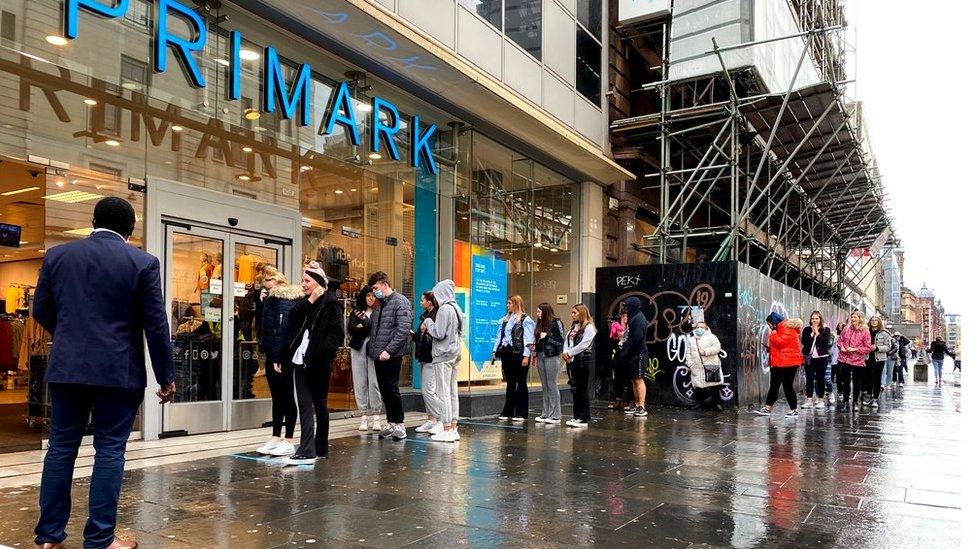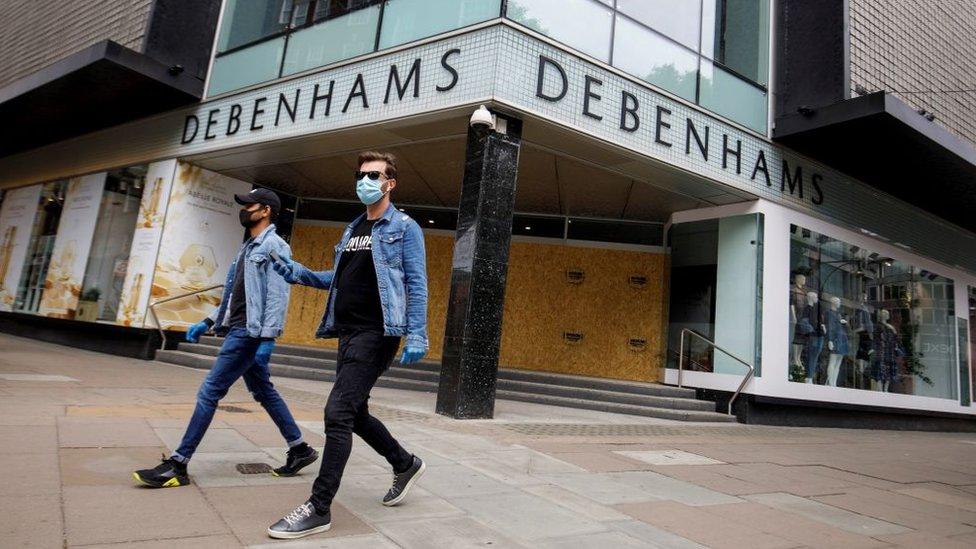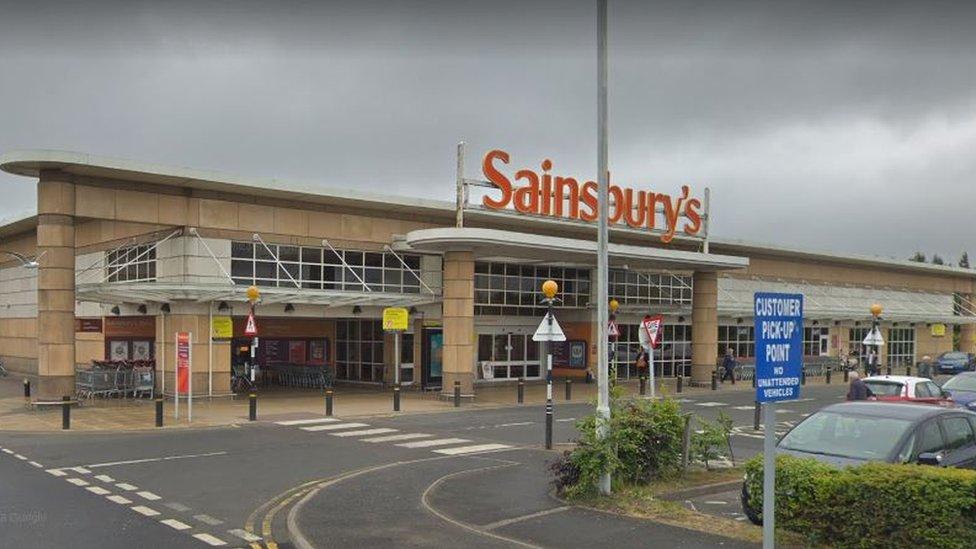Coronavirus: The retail revolution gathers pace
- Published

People queuing in Glasgow city centre to get into Primark when it reopened last month
Imagine half a million jobs being lost in only three years, with the process now accelerating. That's British retail.
Lockdown has boosted the pace of a revolution that has been under way for years. Shop numbers are being drastically cut back.
The main battle front is between retailers and commercial landlords, being forced to reduce rents by firms collapsing, with collateral damage to shopping streets and staff.
Nearly quarter of a million jobs are forecast to disappear this year, in retail alone.
With them, more than 20,000 shops are likely to close.
The numbers, from the Centre for Retail Research, are staggering, as the UK's coronavirus lockdown raises the pace of a structural change that was already under way.
The colossal job loss numbers are not new because of Covid-19 - only higher.
The Centre for Retail Research calculates that 2018 saw 117,000 jobs going across the UK, and more than 14,000 units closing.
It says last year saw 143,000 jobs going, and the closure of more than 16,000 shops. Around a third of those job losses were due to companies going bust: others were due to slimming down, and shedding less profitable units.
The forecast for this year - 243,000 fewer retail jobs - was based on data available in the early weeks of lockdown, so did not take account of it lasting longer than first expected.
Customer shopping habits were already shifting, much of that driven by online competition. Lockdown forced non-essential, non-food shops to close.
Coronavirus: Shopping returns to Scotland's streets
Even as they re-open, they are having to contend with lower footfall, and infection controls constraining numbers and interaction in stores.
Primark may have been a popular destination for the early returners to shops, but will the ultra-cheap garment trade remain in vogue more widely? With the fashion cycle disrupted, will it turn over as fast in future?
And with many more working from home, will the spend on clothes for the office be reduced permanently?
'Restructuring'
The roll-call of company administrations and 'restructurings' is lengthy. Among the better-known names since lockdown began, there was Laura Ashley furniture and fabrics, closing 70 stores permanently and it's not clear how many might reopen.
Cath Kidston homeware, gifts and clothes followed, and has opted to go fully online. Shirt maker TM Lewin recently did likewise.
Debenhams has been in administration and may return there. Oasis and Warehouse fashion saw a complete collapse and closure. LK Bennett fashion went into administration, and the future of its stores network remains unclear.

Monsoon Accessorize went for a pre-pack deal - meaning administration immediately followed by a sale of assets to a new owner, sometimes looking very like the previous one. Many jobs can be salvaged that way, the business keeps trading, and the creditors are off its back.
The bakery/cafe chain Le Pain Quotidien did something similar. So did Go Outdoors, put into administration by JD Sports, and immediately bought back by it.
Poundstretcher is trying to do that through administration for its property arm.
Last week, it was the turn of Bensons for Beds and Harveys furniture, owned by the Blue Group. Most Bensons stores will reopen, after a management buy-back, but it has shed its less profitable ones, while Harveys' future is uncertain.
Quiz fashion, based in Glasgow, put itself in the hands of administrators, and the question of how many of its 82 stores re-open depends on negotiations with landlords.
'Misguided and myopic'
The theme running through many of these is that tussle between retailers and their landlords.
It has to do with lease contracts that were, for decades, more favourable to landlords.
To understand what's been going on, experts pointed me to the days, in the 1980s and 1990s, when retail property was building out rapidly.
Supermarkets were grabbing every opportunity they could find to build, often as anchors for out-of-town retail parks. Councils were enticing developers onto their turf on favourable terms, eager for the business rates and other spin-offs.

Sainsbury's is one of the main stores at the Fife Central Retail Park, Kirkcaldy
With retailers following the trend to sprawling national chains of shops, they were willing to sign up to long leases, often of 25 years, with upwards-only rent revisions. For some department stores, the leases could run for several decades, giving the stability to justify expensive fit-outs and investment in building a customer base.
These rents were paid on an archaic quarterly basis, which skews retail accounting.
With the 2008 financial crash, the brakes were slammed on funding for commercial property.
"Retailers thought it was a bank problem, and that they would return to normal," says one consultant. "But they were being misguided and myopic."
The shift to online was already under way. The long leases were already being replaced by shorter ones, except for big food retailers. Their battle for presence and market share continues.
For most retailers, the 25-year lease has been replaced. Typically, it is now a five-year lease, containing a break point at three years. With less stability, fit-outs are done more cheaply.
And whereas rents have been inflexible, with only upward revisions, retailer power is demanding that more leases base rent on turnover. That runs at about 6 to 10%, with more than half now payable monthly rather than quarterly.
Brutal haircuts
To get landlords to accept the change, firms are using administration, to offload debt, and also less profitable stores and staff. Short of that, they're using CVAs - the Company Voluntary Arrangement.
This avoids administration, with persuasion of 75% of creditor votes that they will get more money out of accepting a flat rate "haircut", or a proportionate reduction in debt, than they will get from dealing with an administrator.
It's a brutal process, in which commercial landlords are deeply frustrated by the legal methods to ditch leases, particularly as they routinely get outvoted by other creditors in a CVA.

Experts have shared concerns about a lack of focus on long-term business challenges
The landlords can often seem to be faceless, distant investment funds, but they point out that their funding is often from pension funds. So reduced returns hit home for many people.
The process has drawn in private equity firms, buying brands with little sentimental attachment to their history or loyalty to their staff, and impatience for turnaround and exit from their investment.
And in shopping centres left behind as the national brand retreats, the new investors - in England, at least - are often local councils, redeveloping unwanted retail space for other purposes, including more social uses.
Some experts warn just one of the risks of this retail revolution is that the focus on reducing rents and store numbers is being driven financially and without insufficient attention to the underlying, longer-term business challenge - that of better understanding shifting shopper behaviour and customer preference, and not only towards online.
- Published3 July 2020
- Published29 June 2020

